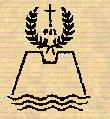|
PACHOMIUS
AND THE FIG TREE
One day, Pachomius came to the monastery of
Thmousons which, like all monasteries, accepted children. Now there in
the center of the monastery was a fig tree which one of the boys was in the
habit of climbing without permission; he plucked the figs and gave it to the
other boys to eat.
When Pachomius came near the fig
tree, he saw an evil spirit sitting in it; his name was devil of
gluttony. And Pachomius knew it was he who tempted the boys. So
the Holy Man called the gardener and told him: "Cut down the fig tree
because it has become a source of evil for the children."
When the gardener heard of this, he was
greatly grieved because he planted all the trees in the monastery and this
fig tree had given the monastery much fruits. But Pachomius insisted:
"Must the needs of the body be of more importance than the needs of the
soul? What benefit is it to the community to be fed with figs while we
lose the souls of our children?"
Seeing how much it would grieve the
gardener to cut down the fig tree, Pachomius did not force him. Next
day, however, the healthy fig tree became completely withered; not one leaf
or fruit was found upon it.
Koinonia II
* * *
ST. PACHOMIUS, THE DEMON AND
THE MONKS
It happened once that St.
Pachomius and Theodore, his beloved disciple, were walking in the monastery
one night. Suddenly, they saw from afar an apparition full of great
deceit. They saw the form of a woman of great beauty. Theodore
was perturbed. But Pachomius, noticing this, said: "Have courage
in the Lord, Theodore, and do not be worried."
Even as Pachomius prayed to
drive away the apparition, she (the apparition) shamelessly came closer to
them with a throng of demons running before her.
She
said: Pachomius, you labor in
vain. God has given me power to tempt those whom I want.
Pachomius: And you,
where are you from and who are you and whom have you come to tempt?
Woman:
I am the devil's daughter. It was I who brought down the most
brilliant theologians of the church. It was I who snatched Judas from
the Apostolic company. Now, Pachomius, I shall make war with you
because, in your monastery, young men and adults alike have trampled upon
me. You have filled them with the fear of God as a most unbreakable
wall that our cohorts cannot approach them.
Pachomius: Have you come
to tempt only me or others as well?
Woman:
Both you and all those like you.
Pachomius: Theodore as
well?
Woman:
Yes, both you and Theodore, but I cannot even approach the two of
you.
Pahcomius:
Why?
Woman:
You turn every harm I send you into profit for your soul because you have
been made worthy to see the glory of God. But you cannot protect the
other monks forever. In the future, because they will not have the
fear of God, I will dance among them.
Pachomius: How do you
know the future? The monks in the future might be more fervent than
we.
Woman:
I do not know the future the way God knows the future. I know the
future by conjecture.
Pachomius: How is
this?
Woman:
From what has happened in the past, I conjecture what will happen in the
future. I know that every act comes from an earnest desire for things
that are sought after with zeal, like the desire to be saved. This
desire is confirmed by God with wonders and signs and gives security to
those who pursue it. But when the desire becomes older and weaker and
stops growing, it slowly withers. Then I come in and destroy
it.
Pachomius: Why do you
tempt only the great monks and not necessarily all the monks.
Woman:
I only wage war against those who seek perfection. God does not allow
me to tempt all; otherwise, many would indeed be led astray.
Pachomius: How do you
destroy souls?
Woman:
We propose evil in the soul of the person who struggles; if he accepts
it, we invade the soul; then we inflame him with fierce
pleasure. But if, by his faith in God, he refuses to receive our evil,
we dissipate like smoke before him.
After this, he commanded her
to go away and bade her never again to approach his monastery. He then
warned all the brothers and the other monasteries to have the fear of God
that they may not fall into temptation.
St. Pachomius, Koinonia II
* * *
ST. PACHOMIUS AND THE HERETIC
Some heretical monks came to
visit St. Pachomius's monastery and announced to the doorkeeper: "Tell
Pachomius, if he is truly a man of God and is confident that God listens to
him, let us both cross the river together walking on our feet on top of the
water. Let us see who has more confidence before
God."
When the doorkeeper announced
this challenge to Pachomius, Pachomius scolded him: "Why do you
listen to such talks and challenges. Such talks are alien to God and
our way of life. There is nothing more wretched than such foolishness
that I should neglect mourning for my sins and thinking how to avoid eternal
punishment and waste time walking on water."
The doorkeeper asked:
"Then how can he who is alien to God walk on water?"
Pachomius answered: "With God's permission and the devil working
with him, he is allowed to fool those the devil has
deceived."
"Go and tell those
heretics that Pachomius puts all his strivings and zeal not in walking on
water but in trying to save his soul." Then Pachomius exhorted
his monks not to show off or to desire to see apparitions and demons or to
tempt God. "You shall not put your God to the
test."
Koinonia II
(10-29-04)
|

